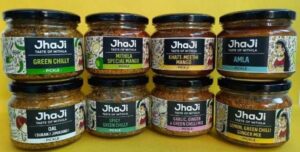How her love for pickles turned Kalpana Jha into a passionate entrepreneur

Kalpana Jha and her hotselling Mithila Mango Pickle
Upasana Kaura
Born in Darbhanga, and brought up in cities across Bihar, Kalpana Jha, 52, grew up in a joint family. Youngest among the five siblings, she completed her MA and was married off to a Bihar government officer. Life went on a much predicted track with Kalpana managing her home and hearth. But underneath that normal housewife was a budding entrepreneur waiting to come out. It was only a matter of time when she would expand her wings! And, expand she did, and how!
Now, our lady from Darbhanga (Bihar) was always interested in pickles. Who isn’t, you would say? Well, she just didn’t love eating those, but enjoyed making as well. That’s where the story starts.
Achaar always held Kalpana’s special attention. She loved making different kind of pickles at home, and gifting to members of extended family and friends, who gave more than a generous feedback on her recipes. “I knew some pickles’ recipes that my mother and grandmother had taught me, few more unique ones were added by my sasuma. I used to make some 50-100kg pickle every year for family and friends from New Delhi to New York,” she smiles.
But it was not until her husband retired from service that the thought of turning her pickle-making hobby into a proper business hit her. Hence was born JhaJi Store – a homemade Bihari Pickles & Chutneys startup – in October 2020.
“I’m excited about building a business from our home in Mithilanchal and sending people pickles that carry Mithila’s pride to every house around the country and the world,” she smiles.
So, share with us your entrepreneurial journey.
Well, both myself and my sister-in-law have been toying with the idea of setting up the business big way. Having perfected our craft over decades, we felt it was time to launch. And after my husband retired that I got the necessary push and support. So, you see, relatively speaking, the idea has been brewing over the years but the inspiration struck all of a sudden.
A series of conversations later, we decided to put our plan into action. We got our company, JhaJi Store incorporated, got an FSSAI license as also the shelf life certificates, and started selling online on June 1, 2021 soon after the second pandemic wave was over.
In all, it cost us a little over Rs 10 lakh to set up the business from scratch, including registration and compliances, product development and stocking the first few batches of pickles.
How do you divide time between work and family?
I usually wake up around 6am and spend the first couple of hours preparing myself for the day, as well as delegating work to my household help. From 8 am – 2pm, I totally into the business which includes reviewing the daily production and packaging plan, making sure we have sufficient resources across the stations, and dealing with any operational challenges that may occur.
I take a break between 2 pm and 4 pm – this is when my sister-in-law and business partner, Uma, takes over the responsibilities. I again spend time in the business, typically from 4 pm to 7 pm, and this time is budgeted for interactions with stakeholders in the business, including customers, vendors and media representatives.
Kalpana Jha with her sister-in-law Uma, her business partner
Are there any arguments ever? How do you handle disagreements?
It’s natural for the team to disagree on things when we’re working together. We have a three step-framework to resolve disputes. We evaluate which of the options is better for the business (to survive and thrive), good for the employees and good for the customer. In that order.
For example, on the choice of finalising a vendor for mustard oil which is a key ingredient in pickles (40 per cent of COGS), we first check the cost, quality, payment terms, vendor’s credibility to make sure that all the interests of the business are safeguarded. Second, we introduce the mustard oil to the people who prepare the masala. They make small batches, taste it themselves and get the product tested. Thus, they decide if the ingredient is good to use in their own homes. Third, we weigh the customer feedback on two different batches prepared with two different varieties of mustard oil, in this case. We have a group of 20 long-time customers who have been with the business for a long time. They are given the samples and their feedback informs our product-related decisions.
But I hold the power to veto any decision in this whole process. The reason veto power lies with me is because I controls the most important variable in the business – taste. It is only the taste, smell and sight of the pickle that makes or breaks the business.
You started with pickles & chutneys. Are there plans to expand the product list?
We started with six flavours of pickles and then added 14 more. These include six flavours of Mango pickles as well as unique flavours from local cuisine like Amra, Gobhi Gajar, and Karonda. A few flavours of Chutney and Murabba include Amla, Imli, Lal Mirch and Tamatar.
In addition to the pickles and chutneys, we see an opportunity to expand into dry sweets (ठेकुआ, पीरिकीया, खाजा, अनरसा), dry Namkeen (निमकी, कुमरोरी, अदौरी, tilori, tissauri) and Mithila Makhana.
Growing from Mithila, we see an available opportunity to further expand into the cuisines of nearby regions including other cultures of Bihar (like Bhojpuri) and Purvanchal at large.
Which is your hot-selling product.
Our bestseller combo features our top two hot-selling products – Lal Mirchi Bharua Achaar and Mithila Special Mango Pickle.
From which city does the maximum demand come?
NCR – Delhi, Gurgaon, Noida, Ghaziabad, and Faridabad – make up the largest base for us right now. This is followed by Bengaluru, Mumbai, Pune, Kolkata, Lucknow, Patna, and Ranchi.
Do you also have retail stores? If not, are there plans to set up a few.
We plan to grow the business by scaling our D2C business (on our website) to twice its size from now, triple our current Amazon + marketplace business and entering into strategic retail partnerships in our target areas (India’s top 6 metro cities, Lucknow Zone, Central India Zone, Bihar+Jharkhand) .
Do you have the documented recipes for these pickles and chutneys? Or it’s just stored in memory.
We have detailed documented recipes for all our products. The product team is free to experiment it or tweak the recipes basis customer feedback.We now. have a staff of 50+ women who take care of making the pickles under my (Kalpana Jha’s) supervision.
What are your future plans? Where do you see yourself, say five years from now?
We plan to do Rs 10 crore sale this calender year, with a business model that breaks even at EBITDA level. We’re already there at the top-line (the business hit 80L+ MRR in Jan 2023), but the production and distribution costs need to be optimised. For this, we’re adding warehouses in Bengaluru and Mumbai, developing new vendors for raw materials and mechanising parts of production and packaging processes. In the year 2024, we plan to grow this by 3 to 4 times, generating up to 10% in EBITDA margins.
In the next five years, we have set out to achieve 100 crore in revenue, take our production capacity to 1500 MT and distribute across UAE, US and Europe, apart from India.



